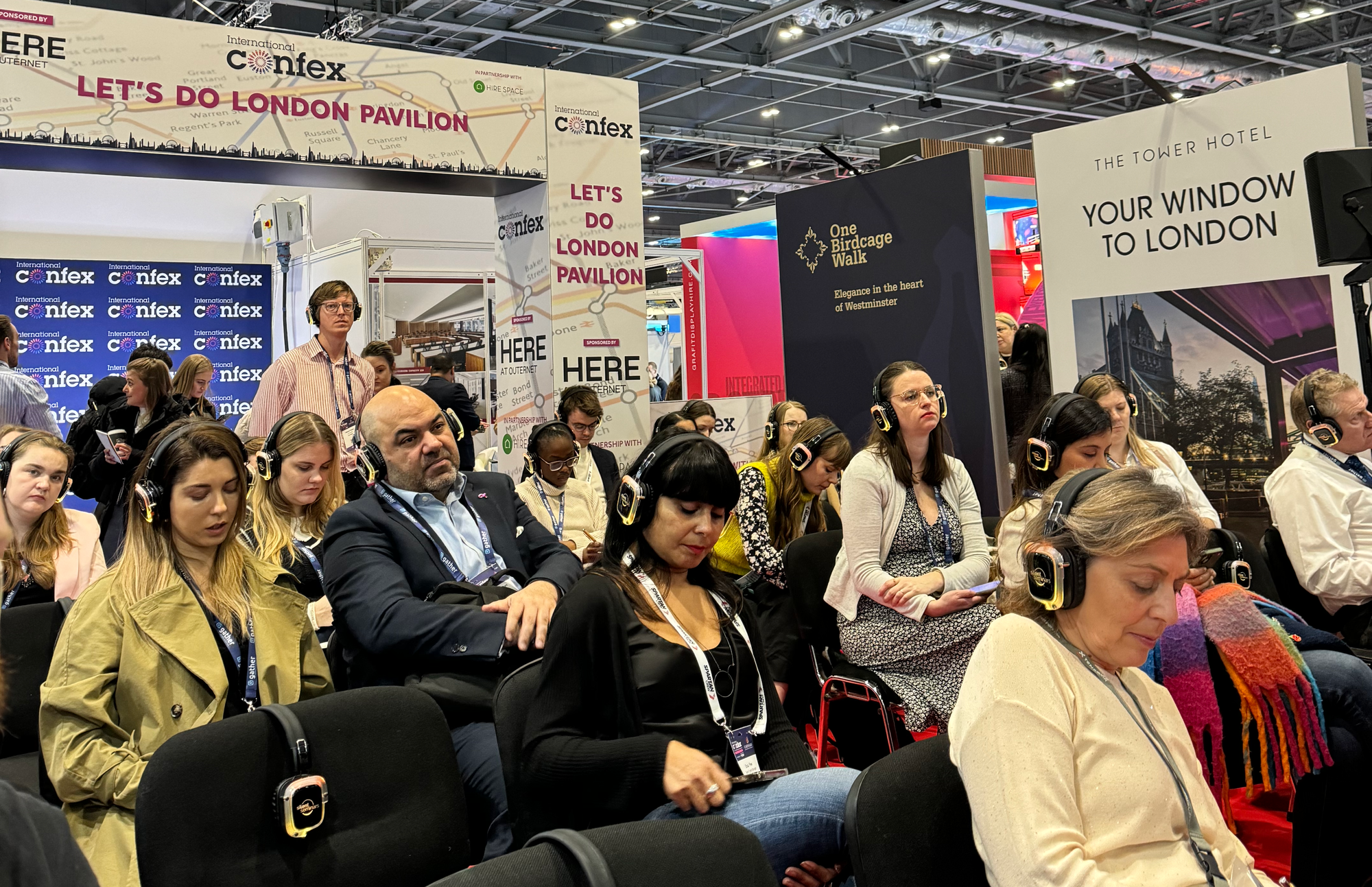The landscape of corporate event planning is continuously evolving, shaped significantly by the aftermath of the pandemic and new market demands. At International Confex, a panel of experts, including Sarah Noakes, Content Sponsorship and Event Manager at AFME, Tiffany Edwards, Head of Events at AXA Insurance and Siobhan Darlington, Event Manager at The Crown Estate, shared their insights on the current challenges corporate event planners face and ways to overcome them.
Adapting to an Evolving Events Landscape
The pandemic has left a lasting impact on the corporate event-planning sector, with challenges such as navigating data, rules, and regulations, dealing with budget constraints and venue availability, and the push for more immersive and experimental events despite frozen or reduced budgets. Event planners are now tasked with creating fresh and immersive experiences for clients within these constraints, making the planning process more work-intensive.
Overcoming Budget and Logistic Challenges
Diving straight into the topic of overcoming budgets, "doing more with less" was discussed several times during the Let's Do London panel. One example was the growing need for bedrooms being tied to events in 4/5 star hotels, which are all added costs that delegates can't afford. With time always being an issue in the events industry, how exactly can event planners juggle frozen budgets and provide better events? We asked our speakers exactly that, and these were their top tips...
Action Points
- Build and maintain strong relationships with stakeholders and set clear objectives from the get-go. Working with advisors to streamline the planning process is a helpful element in avoiding challenges later down the road.
- Think about launching your events in regional locations rather than mainstream cities, that typically charge a premium.
- Create frameworks for internal feedback to focus on event objectives. As Siobhan said, Hire Space 360 is also a great option to streamline event planning amongst teams by consolidating processes and introducing efficiencies.
- Look at merging events where appropriate. Your sponsors will focus on the value added, and the bottom line. If you can achieve similar outcomes with less cost, your sponsors will thank you for it.
- Use AI to streamline your workflows. Check out this handy guide to AI for eventprofs.
- Think carefully about how you measure the impact of your events. The better you can communicate and report on the success of your events, the better case you can make for bigger budgets going forward.
- Be bold! Be clear with your budgets, and with your suppliers, and don’t be afraid to ask how that budget can stretch to meet your objectives. Venues and suppliers will often be creative to meet challenging budgets.

Innovative Solutions and Sustainability
Since the pandemic, there has been an emphasis on sustainability which has resulted in extra costs when planning events. This in hindsight, has been a silver lining, as it has pushed the importance of sustainability in events. - But with the newly arisen problem of greenwashing and inflation, how exactly can event planners incorporate sustainability successfully, on a budget? As Sarah said, "If you do it right, you can outweigh the costs" Let's take a look...
Action Points
- Leverage technology and digital tools to facilitate networking and reduce waste at events. LinkedIn QR codes are a great option to quickly connect with people and foster new connections without the need for printing out paper badges and lanyards.
- Engage with suppliers and venues on their sustainability practices to ensure alignment with event goals. Choose venues that have strong sustainability practices, such as energy-efficient lighting, recycling programs, and water-saving measures. If possible, select a location that is easily accessible by public transportation to reduce carbon emissions from travel. Do your checks and look to see if they are B-corp suppliers, these companies have been through rigorous questioning and you know they're legitimate.
- Use local and seasonal produce where possible. A simple consideration that can save significant costs whilst advancing your sustainability goals.
- Instead of printing brochures, agendas, and promotional materials, opt for digital versions. This reduces paper waste and allows for last-minute updates without the need to reprint.
- Use energy-efficient lighting and AV equipment. Consider the use of LED lights and encourage speakers and exhibitors to turn off equipment when not in use. If possible, power your event with renewable energy sources.
- Ask your venue and suppliers how they are giving back to the community. Nowadays, many will be. Focus on positive social impact, not just the direct impact on the environment.
- A supplier that takes sustainability seriously will always have a great waste policy. Don't just ask them about food waste, but also materials: how do they get rid of materials post-event? There are some great services for this, such as Event Cycle.
- Engage Participants: Educate attendees about your sustainability efforts and encourage them to participate.
- Consider third-party industry resources such as Isla and Event Decision, to make your jobs easier and save time.

Embracing Diversity and Inclusion
The importance of ensuring diversity and inclusion are considered during panel selections should be kept in mind at all times no matter what industry. The events industry as a whole is in a good place when it comes to inclusivity, however, in industries such as finance, there is still a lack of representation regarding ethnic minorities, but, as Sarah says, "progress is slowly being made". We asked our panel speakers what you can do to move forward in the right direction when it comes to inclusivity. For more on diversity and inclusion, take a look at our latest blog on Inspiring Inclusion this International Women's Day.
Action Points
- If you have event sponsors, ask them up front and transparently to consider diversity and inclusion. Focus especially on key speakers.
- Host hybrid events, with speakers dialling in from multiple locations. Also think about hosting events in a wider range of locations, to allow people from other parts of the UK to have easy access. Be flexible.
- Assemble a planning team with diverse backgrounds and perspectives. This can help ensure that multiple viewpoints are considered in every aspect of event planning, from the programming to the marketing.
- Provide mechanisms for attendees to give feedback on the inclusivity of your event. This feedback is invaluable for understanding what worked well and what could be improved for future events.
- Reach out to diverse communities and groups when promoting your event. This helps ensure that information about your event reaches a wide audience and not just your immediate network.
- Consider offering a range of ticket prices, including discounted or free tickets for students, low-income attendees, or non-profit organizations. This can make your event more accessible to a broader audience.
- Take a look at Purple Tuesday by Mike Adams for inspiration on robust thinking on accessibility.

The Path Forward: Skillsets to Make Our Jobs Easier
In the dynamic landscape of today’s industry, professionals are continually exploring the most effective skills and resources to streamline their workflow and enhance productivity. It's clear that professionals must cultivate a diverse skill set that includes creativity, stakeholder influence, and the continuous pursuit of knowledge and innovation. Take a look at the key skill sets our speakers highlighted that are needed going forward in 2024 and beyond.
Action Points
- Think about your digital literacy: Familiarity with event management software, social media, and other digital tools that can help in planning and promoting events is increasingly important.
- Manage expectations, especially during the notably busy third quarter. Clear communication is key for any event professional.
- Event technology is changing fast. Follow brands such as Event Tech Live to stay abreast of new developments.
- Be creative and stay informed about of what's out there. Network, and be innovative.
- Push back and say no sometimes. Siobhan's top tip - just ask and you might get results... Use terms such as “any chance you can..?”
- Develop your negotiation skills. Build relationships with your suppliers, so you can negotiate more easily with them in the future

The International Confex panel highlighted some great topics around the challenges event planners could face in the future. Through strategic partnerships, innovative solutions, and commitment to inclusivity, event planners are poised to navigate through the year and beyond successfully by delivering exceptional experiences for attendees and stakeholders.
We had a great time at Confex catching up with industry peers, and listening to some fantastic content across the two days. We would also like to thank all of our amazing speakers who attended our panels!
If reading about Confex has inspired you to start planning your own events, get in touch below!
Authors

Gemma Baker
Gemma loves all things social media and keeps busy by creating lots of Hire Space content. When she’s not creating content, you'll find her shopping, exploring or at the gym!

Sarah Noakes
Content, Sponsorship and Event Manager at AFME (Association for Financial Markets in Europe)

Siobhan Darlington
Siobhan is an accomplished event manager with over 15 years of experience in the corporate events industry.

Edward Poland
Co-founder of Hire Space. Making event planning a joy with the UK’s leading live venue marketplace.



